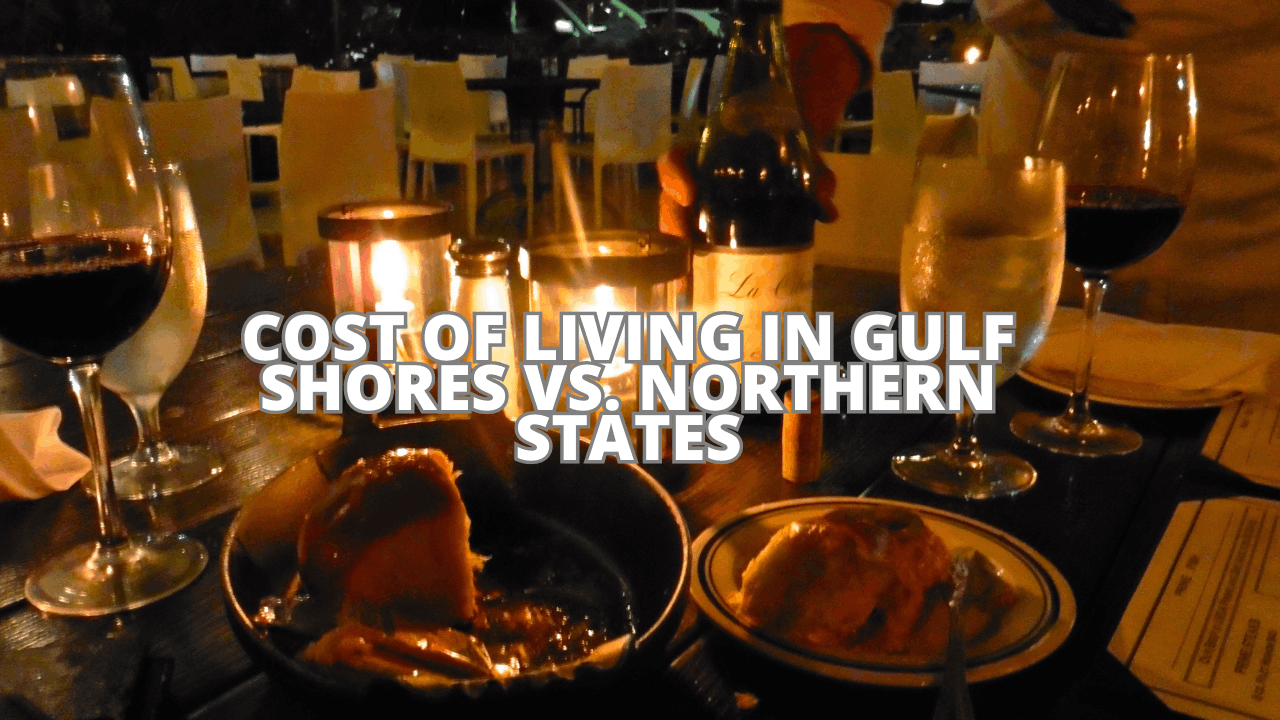Cost of Living: Gulf Shores vs. Northern States

Gulf Shores, Alabama is a popular tourist destination known for its beautiful beaches, warm climate, and laid-back lifestyle.
However, for those considering a move to Gulf Shores, the cost of living is a significant factor to consider. In this article, we will compare the cost of living in Gulf Shores to that of northern states and explore the factors that contribute to the cost differences.
The cost of living in Gulf Shores, Alabama, is generally lower than that of many northern states. According to data from Numbeo, the cost of living in Gulf Shores is 18.5% lower than in New York City, 19.6% lower than in Boston, and 22.6% lower than in Chicago.
This is due in part to the lower cost of housing, utilities, and transportation in Gulf Shores. However, other factors such as healthcare, groceries, and entertainment can vary widely depending on the location.
Overview of Cost of Living
Definition and Importance
Cost of living refers to the amount of money required to maintain a certain standard of living in a particular area. It is an essential factor to consider when making decisions about relocation, retirement, or job opportunities. Cost of living can vary significantly from one region to another, and it is affected by various factors such as housing, food, transportation, healthcare, and taxes.
Understanding the cost of living in a particular area is crucial as it helps individuals and families to plan their finances and make informed decisions. For example, knowing the cost of living in Gulf Shores, Alabama, compared to northern states, can help someone decide if they can afford to relocate to the area.
Factors Affecting Cost of Living
Several factors can affect the cost of living in a particular area. The following are some of the most significant factors:
-
Housing: Housing costs, including rent or mortgage payments, property taxes, and utilities, can significantly impact the cost of living. Gulf Shores, Alabama, has a lower median home price than many northern states, making it an attractive option for those looking for affordable housing.
-
Food: The cost of groceries and dining out can vary significantly from one area to another. According to BestPlaces.net, the cost of food and groceries in Gulf Shores, Alabama, is slightly lower than in North Myrtle Beach, South Carolina.
-
Transportation: The cost of transportation, including gas, car insurance, and public transportation, can also impact the cost of living. Gulf Shores, Alabama, has a lower average commute time than many northern states, which can save residents time and money.
-
Healthcare: Healthcare costs can also vary significantly from one area to another. According to Salary.com, the cost of healthcare in Gulf Shores, Alabama, is slightly lower than the national average.
-
Taxes: State and local taxes can significantly impact the cost of living. Gulf Shores, Alabama, has a lower overall tax burden than many northern states, making it an attractive option for those looking to save money on taxes.
Overall, understanding the cost of living in Gulf Shores, Alabama, compared to northern states, can help individuals and families make informed decisions about relocation, retirement, or job opportunities. By considering factors such as housing, food, transportation, healthcare, and taxes, individuals can plan their finances and make the most of their resources.
Gulf Shores Cost of Living
Gulf Shores, Alabama is a popular destination for retirees, families, and tourists due to its beautiful beaches, mild climate, and outdoor activities. However, the cost of living in Gulf Shores is slightly lower than the national average, but higher than the state average.
Housing and Utilities
According to Best Places, the median home price in Gulf Shores is around $439,200, which is almost 30% higher than the national average. Renting a two-bedroom apartment in Gulf Shores costs around $1,240 per month, which is 13.3% cheaper than the national average. However, the cost of utilities in Gulf Shores is higher than the national average.
Transportation
The cost of transportation in Gulf Shores is slightly higher than the national average. Gas prices are around $2.50 per gallon, which is slightly higher than the national average of $2.40 per gallon. The city has a limited public transportation system, and most residents rely on their cars to get around.
Groceries and Dining
The cost of groceries and dining in Gulf Shores is slightly higher than the national average. According to Salary.com, the cost of groceries in Gulf Shores is around 5% higher than the national average. Dining out is also slightly more expensive than the national average.
Healthcare Costs
The cost of healthcare in Gulf Shores is slightly lower than the national average. According to Best Places, healthcare costs in Gulf Shores are around 7% lower than the national average.
Taxes and Government Fees
Alabama has one of the lowest property tax rates in the country, which is good news for homeowners in Gulf Shores. However, the state has a relatively high sales tax rate of 4%, and the city of Gulf Shores also charges a lodging tax of 6%.
Overall, the cost of living in Gulf Shores is slightly higher than the state average, but slightly lower than the national average. While housing costs are higher in Gulf Shores, the cost of healthcare is lower.
Cost of Living in Northern States
When compared to Gulf Shores, Northern States tend to have a higher cost of living. This section will examine the different costs associated with living in Northern States, including housing and utilities, transportation, groceries and dining, healthcare costs, taxes, and government fees.
Housing and Utilities
Housing and utility costs in Northern States tend to be higher than in Gulf Shores. For example, the average monthly rent for a one-bedroom apartment in New York City is $3,400, while in Gulf Shores, a one-bedroom apartment can be rented for around $1,000 per month. Additionally, utility costs in Northern States can be higher due to colder temperatures in the winter months.
Transportation
Transportation costs can also be higher in Northern States due to the need for a personal vehicle and the higher cost of public transportation. Gasoline prices in Northern States can also be higher due to higher taxes.
Groceries and Dining
Groceries and dining costs can vary widely depending on the location in Northern States. In general, dining out tends to be more expensive in Northern States, but grocery prices can be similar to or lower than Gulf Shores.
Healthcare Costs
Healthcare costs in Northern States can be higher due to the higher cost of living and the higher cost of healthcare services. However, healthcare quality can also be higher in Northern States.
Taxes and Government Fees
Taxes and government fees in Northern States tend to be higher than in Gulf Shores. For example, New York State has some of the highest income taxes in the country, with a top rate of 8.82%. Additionally, property taxes in Northern States can be higher due to higher property values.
Overall, the cost of living in Northern States tends to be higher than in Gulf Shores. However, the higher cost of living is often accompanied by higher salaries and a higher quality of life.
Comparative Analysis
Cost Differences by Category
According to a cost of living comparison, the cost of living in Gulf Shores, Alabama is lower than the United States average. The largest cost differences are in housing, with Gulf Shores being 24% lower than the national average.
Groceries and transportation are also cheaper in Gulf Shores. However, healthcare and utilities are slightly more expensive in Gulf Shores than the national average.
When comparing Gulf Shores to Northern states such as New York, the cost of living in Gulf Shores is significantly lower. For example, according to MyLifeElsewhere, the cost of living in New York is 88% higher than in Alabama. Housing is 259% more expensive in New York than in Gulf Shores, and groceries are 27% more expensive.
Economic Implications
The lower cost of living in Gulf Shores can have positive economic implications for its residents. With lower housing costs, residents may have more disposable income to spend on other goods and services, which can stimulate the local economy. Additionally, lower costs may make Gulf Shores a more attractive location for businesses to operate, which can create job opportunities for residents.
However, the lower cost of living may also have negative economic implications. With lower costs, businesses may be less likely to offer high salaries, which can make it difficult for residents to earn a living wage. Additionally, lower costs may attract retirees, which can put a strain on local resources and infrastructure.
Quality of Life Considerations
The lower cost of living in Gulf Shores may also have implications for residents' quality of life. With lower housing costs, residents may be able to afford larger homes or live in more desirable neighborhoods. Additionally, with lower costs overall, residents may be able to enjoy more leisure activities or travel more frequently.
However, the lower cost of living may also come with trade-offs. For example, with lower healthcare costs, residents may have access to fewer medical resources or lower quality care. Additionally, with fewer job opportunities, residents may have to commute longer distances to work, which can negatively impact their quality of life.
Impact on Residents
Budgeting and Financial Planning
Living in Gulf Shores can be more affordable than living in Northern states. The cost of living in Gulf Shores is lower than the national average, especially in terms of housing costs. For example, the median home price in Gulf Shores is around $300,000, while the median home price in New York City is over $1 million. This means that residents of Gulf Shores can save money on housing costs and use those savings for other expenses.
However, residents of Gulf Shores should still budget and plan their finances carefully. The cost of utilities in Gulf Shores is higher than the national average, which can impact monthly expenses. Residents should also be aware of potential seasonal increases in expenses, such as higher air conditioning bills during the summer.
Employment Opportunities
Gulf Shores is a popular tourist destination, which means that there are many employment opportunities in the tourism industry. This can be especially beneficial for residents who are looking for part-time or seasonal work. The city also has a growing healthcare industry, with several hospitals and medical facilities in the area.
However, residents of Gulf Shores may face limited employment opportunities in other industries. The city has a small population and a relatively low number of businesses, which can make it difficult to find jobs in certain fields. Residents who work remotely or have flexible work arrangements may have an easier time finding employment in Gulf Shores.
Retirement Planning
Gulf Shores can be an attractive location for retirees due to its warm climate, beautiful beaches, and lower cost of living. Retirees can enjoy a relaxed lifestyle and take advantage of the many recreational activities available in the area. The city also has several retirement communities and assisted living facilities for those who require additional care.
However, retirees should carefully consider their financial situation before moving to Gulf Shores. The city does not have a state income tax, which can be beneficial for retirees on a fixed income.
However, property taxes in the area can be relatively high, which can impact retirement budgets. Retirees should also consider healthcare costs and access to medical facilities in the area.
Regional Price Variations
Urban vs. Rural Costs
The cost of living in Gulf Shores, Alabama, can vary depending on whether one lives in an urban or rural area. According to the Bureau of Economic Analysis Regional Price Parities, the cost of living in Alabama's urban areas was 87.7% of the national average, while the cost of living in rural areas was 81.1% of the national average. This means that living in rural areas of Alabama is generally cheaper than living in urban areas.
However, it is important to note that living in Gulf Shores, Alabama, is generally more expensive than living in other rural areas of the state. For example, the cost of living in Gulf Shores is 5.4% lower than the national average, according to Salary.com's Cost of Living Calculator. This is due, in part, to the fact that Gulf Shores is a popular tourist destination, which drives up prices for goods and services.
Seasonal Cost Fluctuations
Another factor that can affect the cost of living in Gulf Shores, Alabama, is seasonal cost fluctuations. During peak tourist season, which typically runs from May through August, prices for goods and services can be considerably higher than during the off-season. For example, the cost of housing in Gulf Shores can be up to 50% higher during peak tourist season than during the off-season, according to a report by Emerald Coast Insider.
In addition, the cost of food and transportation can also fluctuate seasonally in Gulf Shores. During peak tourist season, prices for these goods and services can be considerably higher than during the off-season. For example, the cost of gasoline in Gulf Shores can be up to 10% higher during peak tourist season than during the off-season, according to Salary.com's Cost of Living Calculator.
Overall, it is important to consider both urban vs. rural costs and seasonal cost fluctuations when evaluating the cost of living in Gulf Shores, Alabama. While living in rural areas of the state may be cheaper than living in urban areas, living in Gulf Shores itself can be more expensive due to its status as a popular tourist destination. Additionally, prices for goods and services can fluctuate seasonally, with peak tourist season typically being more expensive than the off-season.
Moving Considerations
Relocation Costs
Moving to Gulf Shores from a northern state can be expensive. The cost of hiring a moving company to transport belongings can range from a few thousand dollars to tens of thousands of dollars, depending on the distance and amount of items being moved. Additionally, there may be costs associated with selling a current home and purchasing a new home in Gulf Shores, such as realtor fees, closing costs, and moving expenses.
Adjusting to a New Cost of Living
Moving to Gulf Shores may also require adjusting to a new cost of living. While the cost of living in Gulf Shores is generally lower than many northern states, there may be differences in the prices of goods and services. For example, groceries and gas may be cheaper in Gulf Shores, but utilities and healthcare may be more expensive. It is important to research and compare the cost of living in Gulf Shores to the current location to determine if the move is financially feasible.
In addition to adjusting to the cost of living, there may also be differences in the lifestyle and culture of Gulf Shores compared to northern states. For example, Gulf Shores is known for its beaches and outdoor activities, while northern states may have more indoor activities and cultural events. It is important to consider these differences and determine if the move aligns with personal preferences and values.
Overall, moving to Gulf Shores from a northern state requires careful consideration of relocation costs, adjusting to a new cost of living, and differences in lifestyle and culture. It is important to research and compare the costs and benefits of the move before making a decision.
Frequently Asked Questions
What are the average housing costs in Gulf Shores compared to northern states?
Housing costs in Gulf Shores are generally lower than in northern states. According to Emerald Coast Insider, the median home value in Gulf Shores is $365,000. In contrast, SmartAsset reports that the median home value in Alabama as a whole is $145,500. In northern states, such as New York or California, housing costs can be significantly higher.
How do utility expenses in Gulf Shores differ from those in northern states?
Utility expenses in Gulf Shores are generally lower than in northern states. According to Numbeo, basic utilities for a 915 square foot apartment in Gulf Shores cost an average of $147.11 per month, while the same utilities in New York City cost an average of $166.35 per month.
What is the cost difference for groceries between Gulf Shores and northern states?
The cost of groceries in Gulf Shores is generally lower than in northern states, although prices can vary depending on the specific items and stores. According to Numbeo, groceries in Gulf Shores are about 14% cheaper than in New York City.
Are property taxes higher in Gulf Shores or in northern states?
Property taxes in Gulf Shores are generally lower than in northern states, although rates can vary depending on the specific location and property value. According to SmartAsset, the average effective property tax rate in Alabama is 0.42%, which is lower than the national average of 1.07%. In contrast, WalletHub reports that northern states such as New Jersey and Illinois have some of the highest property tax rates in the country.
What is the income tax impact on overall cost of living in Gulf Shores versus northern states?
Alabama has a state income tax, while some northern states such as New Hampshire and Alaska do not. However, income tax rates can vary depending on the specific income level and filing status. According to SmartAsset, the state income tax rate in Alabama ranges from 2% to 5%, depending on income level. In contrast, Kiplinger reports that some northern states such as Vermont and Minnesota have state income tax rates of over 8%.
How do transportation costs in Gulf Shores compare to those in northern states?
Transportation costs in Gulf Shores are generally lower than in northern states, although prices can vary depending on the specific mode of transportation and distance traveled. According to Numbeo, a one-way ticket for local transportation in Gulf Shores costs an average of $1.50, while the same ticket in New York City costs an average of $2.75. Additionally, gasoline prices in Gulf Shores are generally lower than in northern states, although prices can fluctuate depending on the global oil market.
Categories
- All Blogs (34)
- Amusement and Entertainment (1)
- #BaldwinCountyRealEstate #GulfShoresLiving #FairhopeHomes #SpanishFort #DaphneAL #LowerAlabamaLiving (2)
- 2024 Presidential Election (1)
- Affordable Living (3)
- Baldwin County News (2)
- Baldwin County Real Estate (3)
- Beaches and Coastal Attractions (1)
- Best Neighborhoods for Snowbirds (2)
- Buying A Vacation Home in AL (3)
- Community and Culture (5)
- Community Events (3)
- Community Spotlights (4)
- Cost of Living in Gulf Shores (4)
- Economic Development (2)
- Family-Friendly Destinations (2)
- Gardens and Nature (1)
- Gulf Shores Neighborhoods (4)
- Gulf Shores VS Near by Cities (1)
- Historical and Cultural Sites (1)
- Housing Market Trends (1)
- Investing (2)
- Living in Gulf Shores AL (8)
- Local Business News (2)
- move to Gulf Shores AL (1)
- Moving to Gulf Shores AL (7)
- Property Taxes (1)
- Pros & Cons (5)
- Real Estate (1)
- Relocating to Gulf Shores AL (10)
- Retiring in Gulf Shores AL (7)
- Sports & Recreation (1)
- Travel & Leisure (2)
Recent Posts











